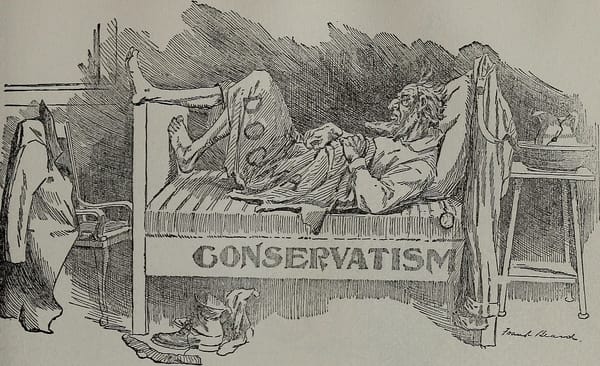
Building a Bigger and Better Liberal Currents
The public fundraiser campaign is over. We are now heads down and putting your donations to good use.

The public fundraiser campaign is over. We are now heads down and putting your donations to good use.

Ideological axes, Venezuela, Greenland, what to pitch us, and more.

Trent and Caitlin ask Evan Urquhart about his 2025 wrap up piece on Assigned Media: "The Year We Lost Everything." They discuss the need to take stock of where we are on trans rights, autonomy and the various freedoms we hold dear, and the value of acknowledging that

On the ending of things and the need for post-diluvian politics.

The social welfare state, winning World War II, and building the liberal order after Trump.

We are moving from an ideologically multipolar world, to a bipolar one.

Minneapolis has shown us the path.

Caitlin and Trent chat with linguistics scholars Savi Namboodiripad and Daniel Midgley on what word most exemplifies 2025. Was it a new coinage? A pre-existing word that gained a new meaning or usage this year? A word that seemed to be on everybody's lips in 2025? Half the

Samantha and guest Will Stancil talk the murder of Renée Good and the Trump administration's larger assault on Minneapolis. Will is on the front lines of monitoring ICE in Minneapolis, working with his neighborhood rapid reaction group, and remains a vital commentator and activist in this disturbing time.

Trent and Caitlin catch up with Greg Sargent from The New Republic about his recent piece exploring the family history and ideology of Stephen Miller. How did the product of Russian Jewish refugees come to see today's refugees as incapable of integration in American society? What are the

It has long been time to leave X. Now, it’s essential.

What’s it like to live in America with a domestic military occupation? Minnesota has the answer.

halftheanswer
Caitlin and Trent speak with livestreamer Audrey Lee about her experiences participating in and documenting protests at the Portland ICE facility. Audrey explains the relationship among the people on the street, the officers of various departments and agencies, and the counterprotesters and right-wing influencers who have been interacting since she

halftheanswer
Trent and Caitlin speak with Professor John Pfaff, author of "Locked In: The True Causes of Mass Incarceration—and How to Achieve Real Reform." They talk about prisons, militarized police, and ICE in today's political climate. Half the Answer can be heard on Spotify, on Apple,

halftheanswer
Caitlin and Trent check in with Daniel Harper of the "I Don't Speak German" podcast, taking another moment to peek under the rock and discover that the creepy crawlies are making friends with each other. They discuss the controversial interview between Tucker Carlson and Nick Fuentes,

halftheanswer
Caitlin and Trent check in with attorney and legal scholar Madiba K. Dennie about the Supreme Court and the originalist reading of the US Constitution—and why the originalist reading is a trap. Half the Answer can be heard on Spotify, on Apple, on YouTube, on Amazon, and elsewhere via

halftheanswer
Trent and Caitlin talk with Emily Glankler of Anti-Social Studies about moments in American history that could inform us about the events of Trump’s second term as president. Who are some characters who resemble the individuals we are dealing with today? Who are the scapegoats? Half the Answer can

halftheanswer
Caitlin plays field reporter at the Portland ICE facility, interviewing the famous Portland chicken suit guy, Jack Dickinson himself, who gives his observations and thoughts after eight months on the scene. Half the Answer can be heard on Spotify, on Apple, on YouTube, on Amazon, and elsewhere via its RSS

halftheanswer
Trent and Caitlin talk with journalist Walker Bragman about the various crises in public health and climate change, the people who helped bring us here, and the dark money that funded it. They discuss the ways disinformation is packaged and spread to discourage the public from being able to access

halftheanswer
Caitlin and Trent catch up with historian and former journalist John Ghazvinian to discuss the state of Iran, its past, present and future, how that has historically intersected with the United States dating back nearly 300 years, why trust is so important in international relations, the JCPOA, the Trump era,

halftheanswer
Caitlin and Trent speak with Jared Holt and Michael Edison Hayden about the infamous right-wing "busybody journalist" Andy Ngo, his work demonizing Muslim immigrants in grad school, and his transition to online political influencer and professional victim with "The Post Millennial" as its editor-at-large. Half the

halftheanswer
Trent and Caitlin are joined by Layla al-Sheikh to discuss that Israel deal and the history of past proposals and solutions. Half the Answer can be heard on Spotify, on Apple, on YouTube, on Amazon, and elsewhere via its RSS feed. Resources: Current updates https://www.nytimes.com/live/2025/

halftheanswer
Christopher Mathias, author of "To Catch a Fascist," speaks to Caitlin and Trent about the events of 2020, clashes between violent fascist clubs and "community defense" groups. They discuss misconceptions about what "antifa" is and what kinds of activities they are engaged in, the

halftheanswer
Trent and Caitlin talk with journalist Jacqueline Sweet about how violence is framed in media as political, the rush to score points for one side or the other, inconsistent standards for free speech and freedom of the press, and the scammy nature of our president and his public statements. Half
Liberal Currents LLC © . All rights reserved.